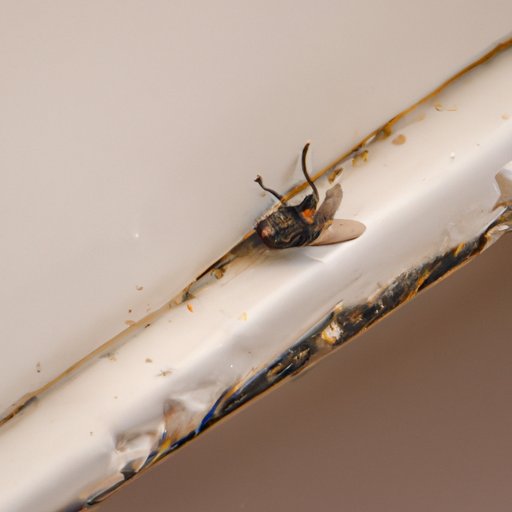Introduction
Before we dive into the nitty-gritty of getting rid of drain flies, let’s take a closer look at these pests and why they’re a problem. Drain flies are small, fuzzy insects that are typically found near standing water, such as sinks, toilets, and shower drains. They are also known to congregate near garbage disposals and trash cans. Drain flies are not harmful to humans, but their presence can indicate a larger issue with your plumbing system.
Diagnostic Steps
The first step in addressing a drain fly infestation is to confirm their presence. Here’s how to identify drain flies and differentiate them from other pests:
- Appearance: Drain flies are small, typically measuring 1/8 inch in length. They have a fuzzy appearance and are usually brown or black in color.
- Behavior: Drain flies are weak fliers and tend to move slowly. They are often seen resting on walls near drains or congregated in large numbers near standing water.
- Smell: Drain flies emit a musty odor, particularly when disturbed.
If you’re still not sure whether you’re dealing with drain flies, try using a piece of tape to capture a few of the insects. You can also shine a flashlight into your drain to look for signs of larvae or pupae.
Chemical-Based Solutions
One of the most effective ways to get rid of drain flies is through the use of chemical-based solutions. Here’s what you need to know:
- Insecticides: Insecticides can be effective at killing adult drain flies. Look for products that specifically mention “drain flies” on the label and follow the application instructions carefully.
- Drain Cleaners: Drain cleaners can help to eliminate organic matter that drain flies use as breeding grounds. However, be cautious when using drain cleaners as they can be harsh and corrosive.
While chemical-based solutions can be effective, they do have some downsides. For one, they can be harmful to the environment and pets. Additionally, they may not address the root cause of the infestation, which could lead to recurrent drain fly problems.
Natural Remedies
If you’re looking for a more eco-friendly or budget-friendly solution, natural remedies for drain flies may be the way to go. Here are a few to consider:
- Vinegar: Vinegar is an effective cleaning agent that can help to remove organic matter and kill drain fly larvae. Mix equal parts vinegar and water and pour down your drain.
- Baking Soda: Baking soda can help to deodorize your drain and loosen clogs. Mix 1/4 cup baking soda with 1/2 cup vinegar and pour down your drain. Let sit for 30 minutes before rinsing with hot water.
- Essential Oils: Essential oils such as peppermint, eucalyptus, and tea tree oil have insect-repelling properties. Add a few drops to a spray bottle filled with water and spritz near drains and other infested areas.
While natural remedies are generally safe and effective, they may not provide the same level of immediate results as chemical-based solutions. Additionally, they may need to be repeated more frequently to achieve the desired outcome.
Physical Removal Methods
In addition to chemical-based and natural solutions, physical removal methods can also be effective for eliminating drain flies. Here are a few options to consider:
- Vacuums: Use a handheld vacuum to capture adult drain flies and larvae. Be sure to dispose of the vacuum contents immediately.
- Fly Traps: Commercial fly traps can be purchased to help lure and catch adult drain flies.
- Other Equipment: There are a variety of other tools and devices on the market designed specifically for eliminating drain flies, such as drain brushes and drain covers.
Physical removal methods can be effective at reducing the number of adult drain flies in your home. However, they may not address the underlying cause of the infestation, which could lead to recurrent problems.
Preventive Measures
Finally, the best way to avoid a future drain fly infestation is to take preventative measures. Here are a few tips:
- Regular Cleaning: Keep your drains and garbage disposals clean and free of organic matter.
- Proper Waste Disposal: Dispose of food waste and other organic materials in sealed containers and dispose of them regularly.
- Repair Leaky Pipes: Leaky pipes can provide an ideal breeding ground for drain flies. Have them repaired as soon as possible.
By taking proactive steps to prevent drain fly infestations, you can save yourself the headache of dealing with the pests down the line.
Conclusion
Getting rid of drain flies can be a frustrating experience, but with the right approach, it can be done. Whether you opt for chemical-based solutions, natural remedies, physical removal methods, or preventative measures, it’s important to take a multi-faceted approach that’s tailored to your specific situation. Hopefully, this guide has provided you with the information you need to tackle your drain fly problem head-on.
